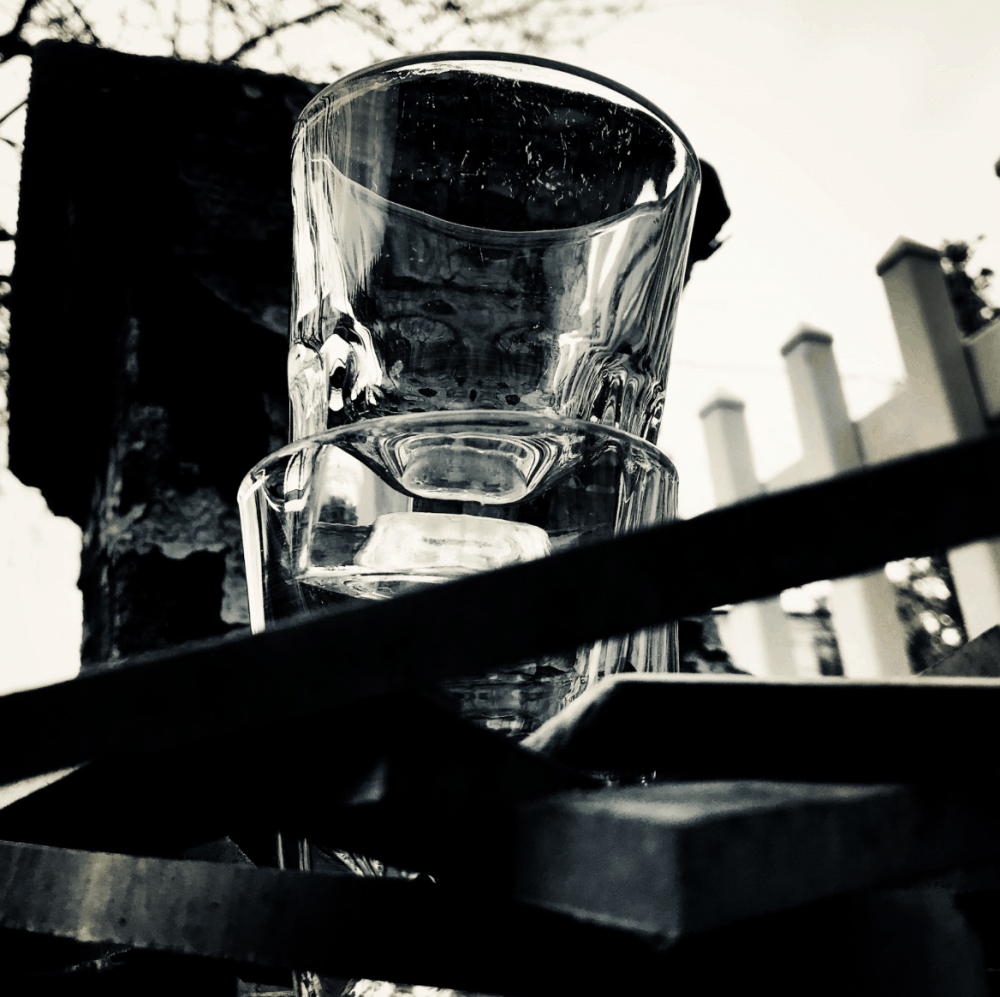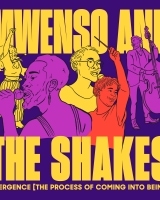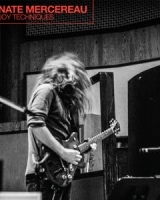Johnnie Walker Blue, Part 1

Kitty exits her office over an hour after the last patient. From across the street, framed by the door, my wife is a frenzied silhouette.
She zips her collar against the lackluster rain. A storm’s not a storm until it speaks above a whisper.
It’s T minus 81 days.
I follow her at a distance and rehearse what I’ll say when we reach her lover’s apartment: You had no right to take our dog. I consulted with a lawyer and you have no right to anything. Between your affair and what I put toward your practice? You’ll end up with nothing. Take a minute, okay? Think about what you’re doing. We have twenty years together. Whatever’s broken, we can fix. All you have to do is go upstairs right now, get Spud, and tell the Good Doctor that it’s over.
She weaves her way into the mayhem of Midtown. I push through non-New Yorkers to keep up.
The migraine-inducing lights of this neighborhood. The smells. Wet garbage. Car exhaust. Perfume and excrement. Who ends a marriage to live in Midtown?
She rushes across an avenue as the lights change, I end up stuck on a traffic island. Thankfully, she slips into an Asian fusion restaurant just beyond the corner.
If she’s getting takeout, nothing needs to change. I’ll follow her “home” — stalker that I am — and threaten her into loving me. However, if she and the Good Doctor are having dinner together…? God help me. I am not waiting outside and watching them share a meal.
The light turns. An undersized woman with an oversized umbrella bum-rushes me. I yield and the rain finds its voice. Altogether different than the rain in Dublin. I’ve known this city too long to bound forward.
I peer through the restaurant’s front window. She is indeed seated, and not alone. Mustering false courage, I push open the door and sidestep the vacant hostess stand.
It’s not the Good Doctor she’s meeting with. It’s her father.
***
The bus ride took two hours from college campus to Kitty’s hometown. It had been a month since we’d last met halfway.
I lost count of the local stops. Some towns, so far as I could see, amounted to no more than a cluster of trees, a strip mall, a post office parking lot. I’d foolishly assumed that life existed outside of our college town.
A man called my name when I disembarked, I spotted him leaning against an electric blue station wagon. He was a distinguished mess of grey curls and laugh lines, built like a long distance runner. “Kitty’s father,” he said, shaking my hand. “Call me Doug.” He helped me load my guitar case in back. “Not a single kind word you could say about that bus ride.”
“It wasn’t so bad,” I smiled.
“You’re a better man than I.”
Kitty, it turned out, had been asked to work a double at her residency and would perhaps make it home for dinner. Estimating the hours until nightfall, I uneasily eased into the passenger seat.
Doug told me to reach by my feet, where I discovered a thick portfolio with pages full of CD’s — everything from Buffalo Springfield to Count Basie to Bach. He left it to me to choose the soundtrack for our ride, and — in a move he later told me earned big points in his book — I proceeded to talk about his collection for so long that we never got around to playing anything.
We swung through a small downtown area and passed some franchises, turned onto a winding road that took us through apple orchards and pumpkin patches. Their home was a two-story white colonial with bright blue shutters and a rolling yard out back. It made me think of a line from an old folk record: “Home is where the heart skips.”
Inside, Doug gave me the ten-cent tour. The downstairs hallway was lined with grandfather clocks in various states of (dis)repair. I paused to study the exposed gears and cogs, giving him all the invitation he needed to expound upon his hobby. A heart surgeon by trade, he couldn’t help but continue tinkering in his off-hours.
“You seem pretty easy-going for a heart surgeon,” I said.
“Go into medicine, you learn early on,” he said, “enjoy whatever free time you get.”
Predictably, every inch of Kitty’s upstairs room was covered in books and pillows and posters. What I couldn’t have anticipated was the life-size cutout of Prince mounted over her bed.
“Every parent makes mistakes,” said my future father-in-law. “Mine was taking her to see Purple Rain in the theater.”
We meandered down the hall examining her childhood photos, buckteeth and all. I heard about riding lessons and failed ballet, AP English and the summer she spent working at a pig farm. It was clear from the outset that Doug loved his daughter, respected and trusted her to such an extent that he felt no need to grill me about my intentions nor test my character. I was his guest as much as hers.
The phone rang when we returned downstairs — Kitty’s mother had been called into surgery. “Lucky you,” he said, hanging up. “If skulls needed cracking over Kitty’s choice of a boyfriend, she would’ve been the authority.” He poured us glasses of seltzer and began cutting a lemon with noticeable precision. “I suppose it might have helped the joke if you knew she was a brain surgeon.”
He walked me into the den, where a towering built-in bookcase overtook an entire wall — academic volumes and paperbacks and records clamoring to be chosen. Wise-cracking he’d give me time to review all of my options, he slipped a copy of Lou Reed’s Coney Island Baby onto the turntable. Over the sultry, sardonic lyrics that followed, we chatted about music and medicine, my next semester’s course load and the internship I’d landed.
“I never thought I’d work in an office,” I said, “but it turns out I kind of like making sense of numbers.”
“Didn’t Kitty mention something about sending you that direction?”
“I started in her program, but it wasn’t the best fit.”
“And can you play that guitar you carry around, or is it purely for show?”
Grinning, I rose.
“I like that you’re an artist, Nolan,” he said. “I also like that you’re not going to be starving.” By the time I returned with my case from the front room, he’d got out two crystal glasses and bottle of Johnnie Walker Blue. “Five o’clock somewhere, and the women are off saving the world.”
He led the way to the back porch, where the fading light turned the green hills silver. I asked if he had any requests, he left it to my choosing. I strummed a chord or two, then eased into “Rocky Raccoon.” By the second verse, Doug had joined me in crooning an exaggerated country version of McCartney’s vocals. I sipped the smooth, rich Scotch he offered, having no context at the time for the cost.
As the sky shifted and fog rose to cover the ground, we worked our way through the full Beatles’ catalogue album by album in chronological order — him declaring obscure B-sides to be his favorite tracks and me, more often than not, managing to unpack the melodies by ear.
Bit by bit, we eroded the level of whiskey. We laid siege to the kitchen pantry — foregoing my future mother-in-law’s rice crackers in favor of Kitty’s doomsday supply of sugar cereal. Still left wanting, we nuked burritos.
By the time Kitty came home, we were both a little looped. “Hi guys,” she said, hovering by the door. “Having a good time?”
[To be continued…]
—

